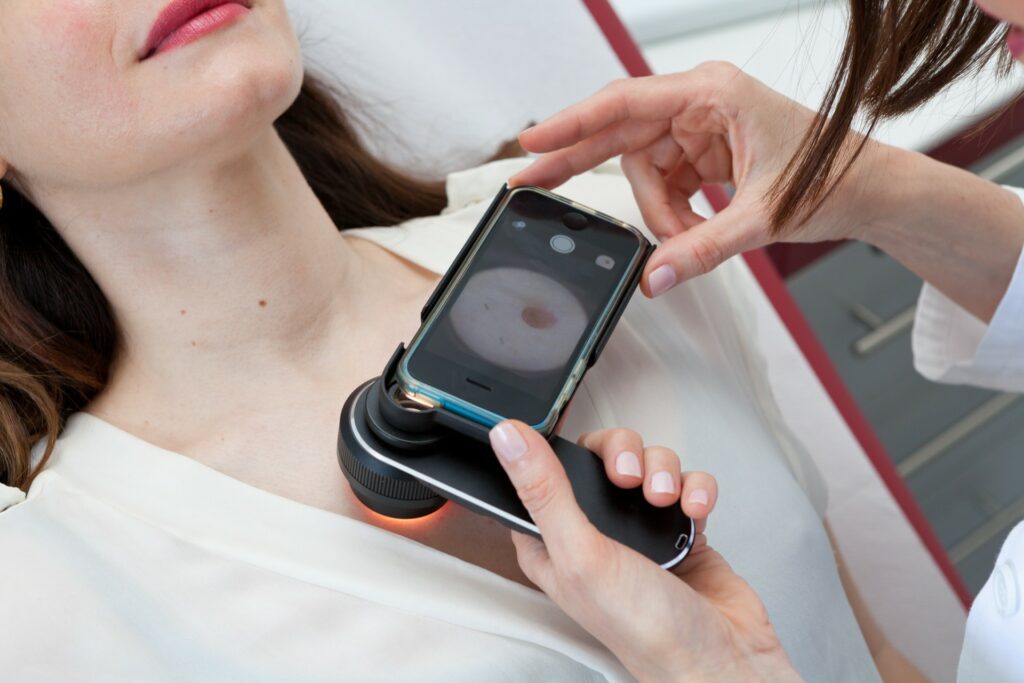The When and What of Skin Cancer Screenings

When it comes to skin cancer screenings, most people do not know where to start until they see something on their skin that concerns them. Although skin cancer, especially in older adults, is common, it is good to know when to start getting skin cancer screenings and what to expect. Due to the commonality of skin cancer in the United States, licensed dermatologists are able to successfully perform checks and provide treatment options. It is best to work with your local dermatologist so if there are questions or concerns, you can get answers promptly.
The two most common skin cancers are basal cell and squamous cell carcinomas. These are highly treatable and curable with targeted treatment from your trusted dermatologist. Although most skin cancers are nothing to be concerned about, melanoma is a dangerous type and requires immediate attention from a medical professional. A reputable dermatologist can diagnose treatable and concerning signs of skin cancer and advocate for patients in both instances. Visual skin exams can be performed in the office and are often covered by insurance.
When Is It Time to Get Screened for Skin Cancer?
Skin cancer screenings are not age-specific but do affect more people as they age. Any individual with a risk of skin cancer, a family history of skin cancer, or a concerning mark on the skin should schedule an appointment. There are some individuals who are more susceptible to skin cancer, and those include those with fairer skin, red or blonde hair, and light-colored eyes. Prolonged exposure to the sun’s harmful rays or tanning bed use are also significant factors that can be attributed to skin cancer. A person with many moles would also benefit from earlier skin cancer screening. Any family history of melanoma should be looked at sooner rather than later, and in these instances, insurance often covers the skin cancer exam.
Early detection is crucial when it comes to skin cancer. So, go with your gut. If you see something on your skin that concerns you, schedule a skin cancer screening. If nothing else, it will put your mind at ease and potentially help you find treatment for whatever you are concerned about.
What Happens During Screenings?
Skin cancer screenings are a visual exam of the skin. Anything that looks suspicious will lead to a more pointed exam, and individuals may be asked to change into a medical gown. All screenings should be done in the dermatologist’s office and do not require anesthesia. Skin cancer screenings are head to toe exams, and professional dermatologists will honor each patient’s comfort level. Undergarments are worn throughout the exam, and some areas of the body may not be comfortable to be checked. So, unless there is an area of concern that the patient wants to be checked, the dermatologist will not force the issue.
What if Something Is Found?
If something is found that the dermatologist wants to explore further, a biopsy may be taken. In these cases, the area is numbed for the comfort of the patients, and a small sample of the tissue is removed and sent in for diagnosis. A biopsy only takes a few seconds, and professionals experienced in skin cancer biopsies will only take what is necessary for a pathologist to be able to make an accurate diagnosis. When most people become concerned about skin cancer, they see visual signs, but skin cancer goes beyond the top layers of skin, so a biopsy may look like the lesion is gone, but further treatment may be required.
A Biopsy v Wait and See
When you partner with a professional dermatologist, asking about waiting and watching an area of concern is ok before moving forward with a biopsy, but know the risks. However, this is a viable option in some cases. It is best to follow the guidance of your dermatologist regarding this decision. Dermatologists have completed extensive education and training, and those with years of experience often have a good idea about skin cancer screening results and can guide clients in the best steps forward. The risk of waiting instead of getting the biopsy is that if the lesion is watched and monitored for growth, the larger it becomes, the more difficult it is to treat. Keep this in mind, and always be open and honest with your dermatology professional.
When it comes to your health, skin cancer screenings are likely something you will do in your lifetime. Any skin concerns should be addressed with a professional like Dr. Sherrie Straughn. Working diligently in Atlanta to bring her clients the best skincare possible, Dr. Straugh at Buckhead Dermatology offers skin cancer screenings, and she works with each client in a stellar bedside manner. If you have further questions about skin cancer screenings, contact Buckhead Dermatology today.
